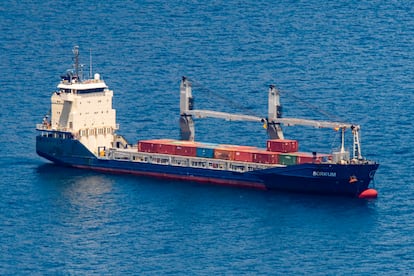A cargo ship accused of carrying weapons to Israel refuses to stop in Spain
The ‘Borkum’ decides not to dock in Cartagena after leftist parties made the claim, which has been denied by the Spanish government. A different cargo vessel with a confirmed destination of Haifa has been refused permission for a stopover

The Borkum, a cargo ship accused by Spain’s leftist parties Sumar and Podemos of carrying weapons to Israel, has refused to stop at the southeastern Spanish port of Cartagena. The decision was communicated at midnight by the shipowner to the Maritime Captaincy and confirmed by sources from Spain’s Ministry of Transportation, who insist that the final destination of the cargo is the Czech Republic and not Israel.
These sources did not rule out that the claim against the Borkum originated in a confusion, as another cargo ship with a confirmed destination of Haifa, in Israel, had been previously denied access to Spanish ports.
The shipowner — a German company, although the vessel is flying the flag of Barbuda and Antigua — “has communicated that the ship will not make the stopover, even though all the ship’s documentation is in order and it would have no problem accessing the port of Cartagena,” said sources at the ministry led by Óscar Puente.
On Thursday the ship remained anchored in the waters of Cape Tiñoso, just off the port of Cartagena, where it was scheduled to dock on Friday morning. A protest had been called at the port on Friday. The ship finally canceled its stopover in Spain and headed for Slovenia instead.
Sumar’s spokesperson in Spain’s lower house, Íñigo Errejón, and Podemos’ candidate to European elections, former minister Irene Montero, congratulated one another on social media, claiming that the decision proves them right. “Victory! We were right. We expect an apology tomorrow. Social pressure is useful, standing up is useful. No complicity with the genocide,” posted Errejón. “Everything was so clear yet we were inventing everything so much that… the Borkum avoids entering the port of Cartagena. Enough of the hypocrisy. Stop criminalizing and ridiculing the Palestine solidarity movement. We are acting to stop the genocide,” Montero added.
The local newspaper La Verdad reported that on Tuesday, an association called Palestina Libre (Free Palestine) and several political groups had claimed the Borkum was carrying weapons to Israel. Transportation Minister Puente denied it on Wednesday, as did Defense Minister Margarita Robles on Thursday.
The decision by the Borkum shipowner came hours after the Spanish government had denied a stopover to another cargo ship, the Marianne Danica, that was loaded with explosives and had departed from Madras Chennai in India en route to Haifa in Israel. It is the first time that the Spanish government has denied authorization to a ship with weapons for Israel, as stressed by the Minister of Foreign Affairs, José Manuel Albares.
The Marianne Danica had requested two permits to transit through Spanish waters and make a stopover in the port of Cartagena on May 21. The ship, which is transporting explosive materials, carries a load of 26.8 tons. The sender is the Indian company Siddharta Logistics Co and its recipient is the company Israel Cargo Logistics (ICL). Sources consulted by this newspaper did not rule out that the public complaints against the Borkum were due to its getting confused with the Marianne Danica.
Experts in maritime traffic have underscored that Houthi attacks against cargo ships in the Red Sea have caused many vessels from Asia to take a detour through the Cape of Good Hope and the Strait of Gibraltar, where all ships headed for Israel now go through.
Sign up for our weekly newsletter to get more English-language news coverage from EL PAÍS USA Edition
Tu suscripción se está usando en otro dispositivo
¿Quieres añadir otro usuario a tu suscripción?
Si continúas leyendo en este dispositivo, no se podrá leer en el otro.
FlechaTu suscripción se está usando en otro dispositivo y solo puedes acceder a EL PAÍS desde un dispositivo a la vez.
Si quieres compartir tu cuenta, cambia tu suscripción a la modalidad Premium, así podrás añadir otro usuario. Cada uno accederá con su propia cuenta de email, lo que os permitirá personalizar vuestra experiencia en EL PAÍS.
¿Tienes una suscripción de empresa? Accede aquí para contratar más cuentas.
En el caso de no saber quién está usando tu cuenta, te recomendamos cambiar tu contraseña aquí.
Si decides continuar compartiendo tu cuenta, este mensaje se mostrará en tu dispositivo y en el de la otra persona que está usando tu cuenta de forma indefinida, afectando a tu experiencia de lectura. Puedes consultar aquí los términos y condiciones de la suscripción digital.








































